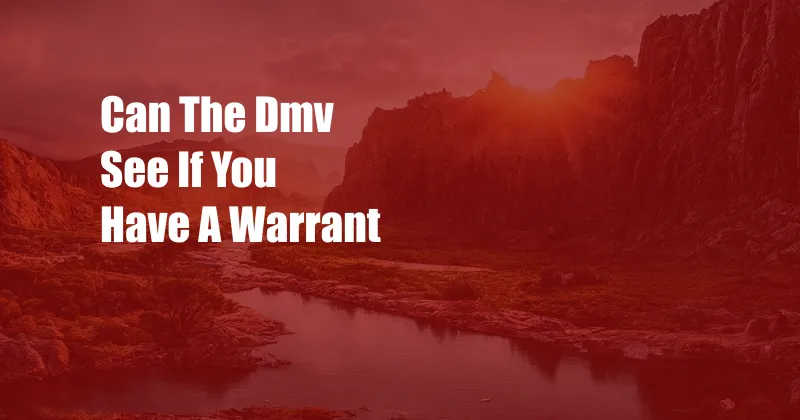
Can the DMV See If You Have a Warrant?
Imagine this: you’re leisurely driving down the road, lost in the rhythm of the music when suddenly, flashing lights appear in your rearview mirror. Your heart leaps into your throat as you pull over, wondering what you’ve done wrong. The officer approaches your window, and after a brief exchange, you are hit with a bombshell: “There’s a warrant out for your arrest.”
The news leaves you reeling. You had no idea there was an outstanding warrant against you, and now you’re facing the prospect of being hauled off to jail. But wait, can the officer see your warrant simply by running your license through the system? Or is there more to this bureaucratic labyrinth?
The DMV’s Data Access
To understand how the DMV interacts with warrants, we need to delve into the complex tapestry of data-sharing agreements between various agencies.
In most states, the DMV has access to records from the state’s court system. This means that if you have an outstanding warrant, whether it’s for a traffic violation or a more serious offense, the DMV may be able to see it when they run your driver’s license.
Warrant Visibility: The Legal Perspective
The legal framework governing warrant visibility by the DMV varies from state to state. In some jurisdictions, the DMV is required by law to notify law enforcement if they discover an outstanding warrant during a license check. In other states, the DMV is prohibited from proactively disclosing this information without a specific request from the police.
It’s important to note that even if the DMV does not have direct access to warrant information, they may still be able to provide law enforcement with clues that could lead to your arrest. For example, if you have an unpaid traffic ticket that has escalated to a warrant, the DMV may be able to flag your license as “suspended” or “revoked,” which could trigger an interaction with the police during a traffic stop.
Avoiding Unpleasant Encounters: Proactive Measures
To prevent unpleasant encounters with law enforcement due to outstanding warrants, it’s crucial to take proactive steps. Regularly check your court records to ensure you don’t have any outstanding tickets or other legal matters that could result in a warrant. If you have any past due fines or fees, make arrangements to pay them off as soon as possible to avoid escalation.
Expert Advice for Navigating Warrants
If you discover that you have a warrant out for your arrest, it’s essential to seek legal guidance. An experienced attorney can help you understand your rights, negotiate with the court, and work towards a resolution that minimizes the impact on your life.
In some cases, it may be possible to have the warrant quashed or recalled, especially if it was issued in error or if there has been a significant lapse of time since the underlying offense. An attorney can assess the situation and advise you on the best course of action, whether it’s surrendering to authorities, negotiating a payment plan, or fighting the warrant in court.
FAQs on Warrants and the DMV
Q: Can the DMV see if I have a warrant in another state?
A: It depends on the state’s laws and data-sharing agreements. Some states have reciprocal agreements that allow them to access warrant information from other states.
Q: What should I do if I am pulled over and the officer discovers a warrant against me?
A: Remain calm and cooperative. Provide the officer with your name and contact information. Do not resist arrest, as this could lead to additional charges.
Q: Can I get a driver’s license if I have a warrant?
A: In most states, you will not be eligible for a driver’s license if there is an outstanding warrant for your arrest.
Conclusion
Understanding the relationship between the DMV and warrants is essential for staying on the right side of the law. By taking proactive steps to clear up any outstanding warrants and seeking legal guidance when necessary, you can avoid unnecessary confrontations with law enforcement and maintain your freedom.
Is this article helpful? Let us know in the comments below!